- Home
- Greg Van Eekhout
Dragon Coast Page 2
Dragon Coast Read online
Page 2
Spray obscured the wheelhouse windows, but he could imagine the glares of contempt directed at him by the captain and radio operator. Sailors knew better than to be out in this weather. Only the privilege of Gabriel’s high office shielded him from complaint. They might think nasty things at him, but they wouldn’t say them out loud. There was only one person who told him to his face when he was being stupid.
The bright orange life jacket the captain insisted Gabriel wear did little to make him look rugged, nor did his constant and futile attempts to wipe water off his glasses. He entertained no illusions about his appearance. He was a man thinned by late hours and skipped meals, with a physique well suited to the strenuous exercise of lifting pens and bending over engineering diagrams and grimoires. He pocketed his glasses and squinted into the wet gloom.
Beneath the surface, the Pacific Ocean churned, 760 trillion pounds of water that made Gabriel Argent’s own network of aqueducts and canals and sewers and pipes seem like a dribble.
And there were other powers lurking among shipwrecks and whale carcasses: the magically potent remains of kraken, and dragon turtle, and horse-serpents sleeping in the crushing depths.
The only thing that made Gabriel even more uneasy than the sea was the sky.
A voice crackled through the intercom speaker: “We have visual contact.” It belonged to the pilot of the spotter plane, three thousand feet up and six miles downrange. He was probably hating the weather even more than Gabriel was.
Gabriel peered through the binoculars, but he could see nothing through the wadded low clouds.
“Max?”
Max leaned into the wind and lurched up the deck to stand beside him, water streaming from his oilskin hood and from the tip of his long, sharp nose. He gave Gabriel a deadpan glare of annoyance. Unlike Gabriel’s other subordinates, Max wasn’t afraid to call out Gabriel’s mistakes, shortcomings, and bad ideas. That was only one reason Max was more than a subordinate. He was more of an equal who did what Gabriel told him.
“You think I can smell anything with all this water flying in my face?” he said over the storm.
“What’s the point in having a great nose if you’re not willing to use it?”
Max’s grumbles were lost in the wind and wet. He drew in breath, closed his eyes, and analyzed the scents.
“I smell a heart pumping fire,” he said.
From his pocket, Gabriel took a ball of glass about the size of a baby food jar. It was filled with strangely silver water, so pure it glowed with its own light. In his other hand, he held a tuning fork.
“Dragon’s climbing,” came the spotter pilot’s voice. “I’m trying to keep it in range.”
“Max, I need to know if it’s the firedrake.”
Gabriel knew what he was asking of his friend. The dragon, if it was a dragon, was thousands of feet in the air and miles away. Just to detect it at all, Max had to use every bit of concentration and sensitivity he could summon. And Max knew as well as Gabriel that they only had one chance to get this right. There was only enough water in the jar for one attempt.
Gabriel lifted the binoculars again and peered through the thinning low clouds. He saw a dot now. He couldn’t be sure if it was the dragon or his plane or a pelican at lower altitude. This was the price for not using his resources to build a military force. Instead, he used them to deliver water and life through the realm.
“I smell the old Hierarch,” Max said, at last.
This is what Gabriel expected. The Hierarch, of course, was long dead. Daniel Blackland had killed him in a duel, and instead of taking the old wizard’s place as ruler of the Southern Californian realm, Blackland had gone running, devoting himself to keeping the Hierarch’s legacy safe. That legacy was a boy living in an osteomantically generated duplicate of the Hierarch’s body: Sam Blackland.
Unlike Daniel, Sam had acquired a tendency to run toward trouble instead of away from it, and in trying to prevent a cabal of Northern osteomancers from making a weapon of mass destruction in the form of the Pacific firedrake, Sam had ended up being absorbed by the dragon. Or fused with it. Or some other magical thing Gabriel didn’t quite understand.
In any event, killing the dragon meant killing Sam Blackland. Not something Gabriel was eager to do.
The pilot’s urgency cut through the radio crackle. “Dragon’s still climbing. Please instruct.”
“Is there anything else it could be, Max?”
Max held his head rigid, still sniffing. “It’s the boy, Gabriel. You know it is.”
Sam wasn’t the Hierarch. He was a kid. A very decent one. A courageous one. Gabriel wished he could let Sam live.
But the dragon had been ravaging the kingdom. It had breathed fire down on neighborhoods from Sherman Oaks to Palm Springs, from Anaheim to San Juan Capistrano. Whenever the dragon turned inland, houses burned and hundreds died.
All Gabriel had to do was release the silvery water from the jar and strike the tuning fork. A simple procedure that had taken him a year of preparation and thousands of man-hours and millions of dollars. He’d dug deep wells for it. He’d gone back to Catalina to recover the last few extant drops of the dragon’s amniotic fluid. At great expense, he’d built a team of osteomancers and hydromancers who linked the water to the dragon.
The water contained the compressed vibrations of a force equivalent to 25,000 tons of TNT. Release the water, strike the tuning fork, and the dragon would die. And Sam with it.
Gabriel felt the ticks of his watch in his wrist bones, or maybe it was just his pulse. Cold brine sprayed his face, and the deck rose and fell.
“Target climbing,” the pilot reported.
Gabriel sensed Max watching him.
“Climbing fast.”
“Gabriel?” Max reached for the jar, maybe thinking Gabriel had suffered paralysis, but Gabriel moved the jar out of his reach.
“Target above five thousand feet,” came the pilot’s voice.
According to Gabriel’s calculations, the water would lose effectiveness at atmospheric pressures below twelve pounds per square inch.
“Go to the wheelhouse,” he told Max. “Please have them radio the pilot to break off pursuit.”
“Because you don’t want to kill Sam?” Max said. “Because that would put you in Daniel’s crosshairs?”
Gabriel didn’t answer right away. He knew he’d just failed to do his job. “I didn’t want to kill Sam because I didn’t want to kill Sam. Because I wanted to be a good man, Max. But sometimes what I need to be is an awful man.”
“I’m not sure it’s possible to be both. I think you have to choose. I think you chose right.”
Gabriel wiped seawater from his face. “Tell me that again the next time I have to walk through the dragon’s ruins.”
* * *
The next time came less than twenty-four hours later.
Rust-colored smoke smudged the morning sky. On the ground, all was charred wood, blackened and crumbling masonry, and the sodden remains of eight square blocks of Mid-City.
Gabriel toured the wreckage, taking toll. Forty-three houses, sixteen shops, a synagogue, a church, and eighty-nine lives. The fire department had done a good job of preventing the blaze from spreading beyond the neighborhood, and the minimally funded rescue workers had done as well as they could. The Council had done an efficient job of transporting the survivors out to care ships, where they would spend months or years in the dark, scrubbed-out holds of decommissioned oil tankers. Through no fault of their own, they’d languish in homeless prisons, because, well, it was Los Angeles, and Gabriel didn’t yet rule the whole city, only the waterways running through the territories belonging to the great osteomancers.
In the backyard of what used to be a two-bedroom Spanish Revival, he came upon a swing set. The seats had been consumed, leaving chains dangling from the still-burning redwood frame. Beyond that was a swimming pool. Bougainvillea and jacaranda petals turned black and fell into the water, dissolving into ash.
* * *
Gabriel remembered another night of flowers and ashes. He remembered Hancock Park, the neighborhood where he lived in a Tudor mansion until the age of six with his mother and father. He remembered koi ponds and private gondolas and ordinances against noise and excess and anything that might jar the tranquility of affluence.
Gabriel’s father was a real estate attorney. Sedate and successful and rich, he was the sort of person who fit in well there. His mother was an osteomancer, a niece of the Hierarch.
Both his parents’ occupations were obscure to Gabriel. His father did things with stacks of paper and made a lot of phone calls. His mother went to an office where she stirred things, or something like that. He knew his mother didn’t want him to be an osteomancer. Adults sometimes spoke around kids as though they were stupid or deaf, and once at some dinner party, while he was playing with building blocks under the grand piano with one of his cousins, someone asked his mother about Gabriel’s future. And his mother said, “No, not Gabriel. Not the bone trade for him. Not ever.”
Gabriel wanted to be a gondolier when he grew up. He went to private school where everyone told him he was very smart. His hobbies were digging for worms with a bucket and shovel in the backyard, climbing the apricot tree, and throwing rocks into the canal.
Then, one night, a pounding on the door. He shot upright in his bed and went to the bedroom door, but Liliana, Gabriel’s nanny, blocked his way out into the hall.
“It’s nothing,” she said, preempting any questions. “Go to sleep.”
Gabriel trusted Liliana. He trusted the strength of her arms to carry him when he fell off his bike. He trusted the coolness of her hand when he had a fever. When his parents argued, he trusted the steadiness of her voice to read to him and make him believe everything was okay.
But she was wrong now. It was not “nothing.” He could see red and blue lights flashing behind the curtains, and the pounding downstairs continued. He could see with his own eyes and hear with his own ears that it was not “nothing.”
He went to the window and saw four police boats docked in front of the house down on the canal. People in black uniforms were coming up the walkway with cleaver clubs drawn.
The impacts against the door gave way to cracking and splintering and there was screaming. Gabriel ran at Liliana and pushed past her, evading grasping hands that only wanted to protect him. He raced downstairs, turned the corner into the foyer, and then saw his mother truly for the first time.
She held one of the police officers by the throat and lifted him off the ground.
“Leave my house,” she said.
She was a slight woman, with small, graceful hands that Gabriel liked to watch play piano or dance on the keyboard of her manual typewriter or color in his coloring books with him, using his crayons with quick, precise movements. And he had seen her angry, of course, when he threw a ball up to the ceiling fan in the kitchen, when he tracked mud over the pristine white sitting room carpet. But that wasn’t real anger. Real anger was what he saw on her face now, her jaw tense, the veins in her thin arms bulging with the strength of her blood flow. And those fingers of hers penetrated the flesh of the man she hoisted up with one hand, and blood flowed between them.
Gabriel’s father’s face was even worse to look at. He was afraid for his wife, but he was also afraid of her. This was the first time Gabriel was aware of his ability to read people, not through any magical means, but just by observation and thought, even at the most horrible moments. He could witness pain and understand where it came from. It was almost like math. Later, he would understand that he had a useful skill, but now understanding horrible things only made them more horrible.
A man stepped to the front of the group of police officers wearing the wings-and-tusks emblem on his windbreaker. Gabriel learned at school that the wings-and-tusks was the symbol of the Hierarch. First they taught him cursive writing, and then they taught him how to sign his name, and then they showed him how to sign the Pledge of Allegiance, which was printed on a sheet of paper bearing the wings-and-tusks.
Gabriel’s mother took a breath and closed her eyes, and the police officer she had by the neck made gargling sounds. All his flesh sloughed off. All his muscle and tendon. All of what he was splashed to the white carpet in a steaming puddle, and then his skeleton came apart and clattered into the mess.
Gabriel couldn’t identify all the wave of stench that washed over him, the smells of the insides of a human being and the burning, gluey stink of basilisk venom. But he understood that he was smelling power and the consequences of power, and even as he gagged, he knew what he was feeling was a mix of revulsion and attraction and love for his mother and feelings that came more from his belly and heart than from his brain. Later, he would tag this stew of emotion as awe.
The man in the wings-and-tusks sheathed his cleaver club. “You can kill all of us, Madame Argent,” he said. “But the Hierarch will send more. And this time, instead of just taking you, he will also take your husband. He will also take your son.”
Things happened so quickly after that. There was the briefest of kisses exchanged by his mother and father. There was sorrow and love in his mother’s eyes as her hand brushed Gabriel’s cheek. And then she was placed in handcuffs that she could surely burn through if she wanted, and she went meekly with the police and the man in the wings-and-tusks.
They put his mother in a boat, and he never saw her again.
They did not hurt Gabriel or his father, but some of the police stayed behind and splashed cans of gasoline all over the house. They lit it with a candle they found on the piano, and Gabriel and his father were made to stand across the street and watch while their house caught fire and burned to ashes.
Through all the smells of the fire, bitter wood, and plastic and chemicals and upholstery, the scents of his mother’s power cut through. The smell was so strong, but her power had not been enough to save Gabriel from his loss.
There was a lesson in that. Decades later, Gabriel was still trying to work it out.
* * *
“Gabriel.”
Soot smudged Max’s fingers and pant cuffs. He’d been sniffing through the ruins.
“Don’t sneak up on me like that, Max. It’s rude.”
“I’ve been standing behind you for at least half a minute.”
“Well, next time cough or something, so I know you’re there.”
“How is coughing preferable to saying your actual name?”
“Don’t change the subject,” Gabriel said. “Tell the fire captain that we’ve got a hotspot here.”
“Already did. She’s sending her people over. You should stop reminiscing and get out of their way.”
“Reminiscing?”
“You always reminisce after a fire. You can’t burn toast without getting that faraway look.”
“Change the subject, Max.”
Max tilted his magnificent, invaluable nose to the air. Powerful people had made Gabriel extravagant offers for that nose, and the analytical brain that came attached to it. Money, favors, promises to kill this or that of his enemies and support him against this or that osteomancer.
Gabriel’s answer was always the same: “You wouldn’t like Max. He bites.”
Gabriel slogged through a soup of burned and soaked timbers and roofing shingles and furniture fabric and plaster, out to the sidewalk. The remains of people’s lives stuck to his shoes. Most of the houses on this block were just foundations and chimneys now. A few survivors picked through wreckage, searching for heirlooms. A man clutched a ruined book to his chest. A photo album, a corpse of memories.
Witnesses said the attack came in the predawn dark. It was fire from above, with no sounds of explosions, no shaking, and it left behind no craters or shrapnel.
“Do you want to know what caused the fire?” Max said.
But Gabriel already knew.
THREE
Seven miles south of downtown Los Angeles sprawled an Assyrian palace. Concret
e sphinxes looked out atop the walls. Bas-relief griffins decorated towers and buttresses, all modeled on the citadel of King Sargon the Second. The building had served as a tire factory, a shopping center, and was now the stronghold of an industrious osteomancer named Isaac Slough.
Daniel Blackland followed Slough down the catwalk overlooking the factory floor. Daniel liked what he saw. Technicians in white coats and gloves handled glassware that came sparkling out of autoclaves. Their worktables gleamed with cleanliness. In a soft tweed jacket and steel-rimmed glasses, Slough himself looked prosperous and professorial.
“I’m surprised you came to me,” he said, taking Daniel down a spiral staircase to the floor. “I’m not the only person in the realm doing this kind of work.”
“But you’re the only one who was trained in the Ossuary. You’re the only one who isn’t running a slop-and-chop shop.”
Daniel peered through the pancake-sized portholes in the stainless-steel tanks hooked to complex nests of pipes and hoses. Some contained tendrilled things that resembled mandrake roots. Other golems, farther along in gestation, had grown faces. One looked to be a boy of ten or eleven. Golems didn’t grow like fetuses. They were more like vegetables, or mushrooms, or mineral formations. They grew according to a different set of natural laws.
Slough led Daniel into his office and shut the door. Bay windows flooded the place with bright sunlight and showed views of industrial surroundings—welding yards and machine shops—creating the sense that this was an exalted oasis in an ugly world.
“The first thing to consider,” said Slough, settling into one of the sleek leather chairs arranged around a sleek glass coffee table, “is the quality of your source.”
Daniel took the other chair. He felt as though he’d voluntarily lowered himself into the cup of a slingshot primed to launch him through the window. And what kind of paranoid had he become that now he even distrusted furniture?
“This is the source,” he said, handing Slough a small glass jar. It contained a single strand of brown hair.
Slough held it up to the light. He squinted and pursed his lips in judgment. “Generally I prefer to work with more material.”

 Weird Kid
Weird Kid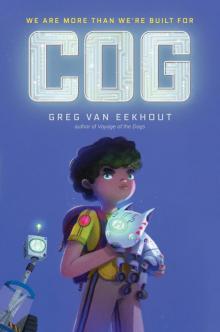 Cog
Cog The Boy at the End of the World
The Boy at the End of the World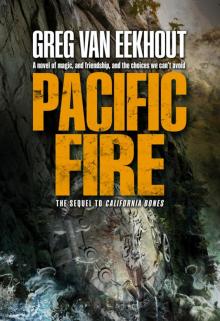 Pacific Fire
Pacific Fire Voyage of the Dogs
Voyage of the Dogs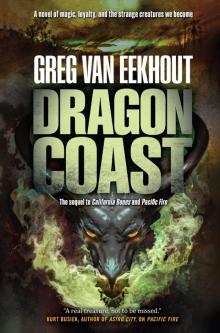 Dragon Coast
Dragon Coast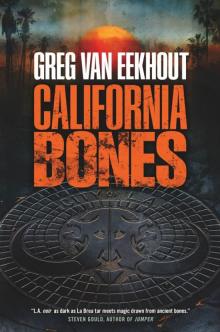 California Bones
California Bones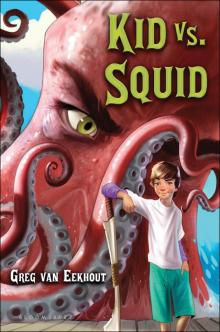 Kid vs. Squid
Kid vs. Squid